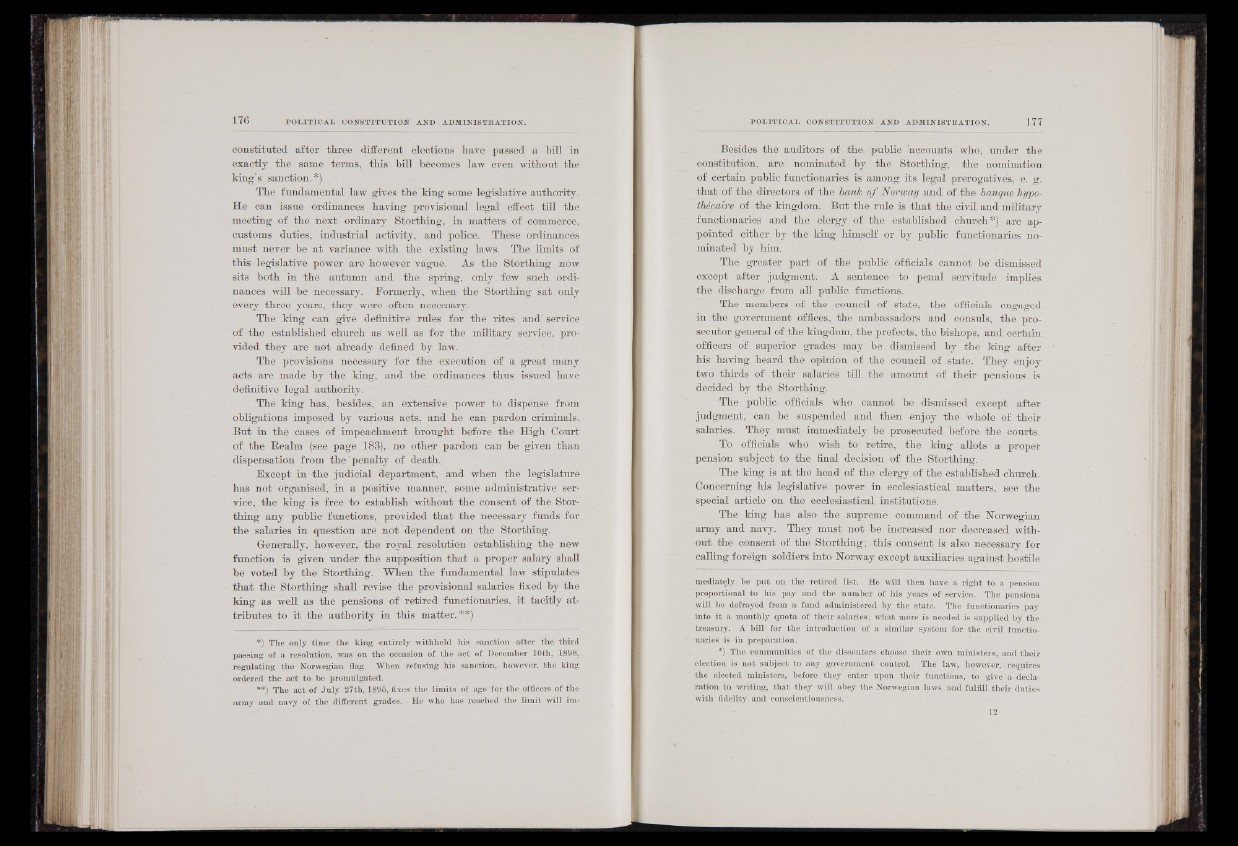
constituted after three different elections have passed a bill in
exactly the same terms, this bill becomes law even without the
king’s sanction.*)
The fundamental law gives the king some legislative authority.
He can issue ordinances having provisional legal effect till the
meeting of the next ordinary Storthing, in matters of commerce,
customs duties, industrial activity, and police. These ordinances
must never be at variance with the existing laws. The limits of
this legislative power are however vague. As the Storthing now
sits both in the autumn and the spring, only. few such ordinances
will be necessary. Formerly, when the Storthing sat only
every three years, they were often necessary.
The king can give definitive rules for the rites and service
of the established church as well as for the military service, provided
they are not already defined by law.
The provisions necessary for the execution of a great many
acts are made by the king, and the ordinances thus issued have
definitive legal authority.
The king has, besides, an extensive power to dispense from
obligations imposed by various acts, and he can pardon criminals.
But in the cases of impeachment brought before the High Court
of the Realm (see page 183), no other pardon can be given than
dispensation from the penalty of death.
Except in the judicial department, and when the legislature
has not organised, in a positive manner, some administrative service,
the king is free to establish without the consent of the Storthing
any public functions, provided that the necessary funds for
the salaries in question are not dependent on the Storthing.
Generally, however, the royal resolution establishing the new
function is given under the supposition that a proper salary shall
be voted by the Storthing. When the fundamental law stipulates
that thè Storthing shall revise the provisional salaries fixed by the
king as well as the pensions of retired functionaries, it tacitly attributes
to it the authority in this matter. **)
*) The only time the king entirely withheld his sanction -after the third
passing of a resolution, was on the occasion of the act of December 10th, 1898,
regulating the Norwegian flag. When refusing his sanction, however, the king
ordered the act to he promulgated.
••) The act of July 27th, 189.6, fixes the limits of age for the officers of th e
army and navy of the different grades. He who has reached the limit will im-
Besides the auditors of the public paccounts who, under the
constitution, are nominated by the Storthing, the nomination
of certain public functionaries is among its legal prerogatives, e. g.
that of the directors of the bank o f Norway and of the banque hypothécaire
of. the kingdom. But the rule is that the civil and military
functionaries and the clergy of the established church*) are appointed
either by the king himself or by public functionaries nominated
by him.
The greater part of the public officials cannot be' dismissed
except after judgment. A sentence to penal servitude implies
the discharge from all public functions.
The members of the council of state, the officials engaged
in the government offices, the ambassadors and consuls, the prosecutor
general of the kingdom, the prefects, the bishops, and certain
officers of superior grades may be dismissed by the king after
his having heard the.opinion of the council of state. They enjoy
two thirds of their salaries till the amount of their pensions is
decided by the Storthing.
The publi#| officials who cannot be dismissed except after
judgment, can be suspended and then enjoy the whole of their
salaries. They must immediately be prosecuted before the courts.
To officials who wish to retire, the king allots a proper
pension subject to the final decision of the Storthing.
The king is at the head of the clergy of the established church.
Concerning his legislative power in ecclesiastical matters, see the
special article on the ecclesiastical institutions. .
The king has also the supreme command of the Norwegian
army and navy. They must not be increased nor decreased without
the consent of the Storthing; this consent is also necessary for
calling foreign soldiers into Norway except auxiliaries against hostile
mediately be put on tbe retired list. He will tben bave a right to a pension
proportional to bis pay and tbe number of bis years" of service. Tbe pensions
will be defrayed from a fund administered by tbe state. Tbe functionaries .pay
into i t a monthly quota of their salaries-; wbat more is needed is supplied by the
treasury. A bill for the introduction of a similar system for tbe civil functlo-
naries is in preparation.
•) The communities of the dissenters choose their own ministers, and their
election is not subject to any government control. The law, however, requires
the elected ministers, before they enter upon their functions, to give a declaration
in writing, th a t they will obey the Norwegian laws and fulfill their duties
with fidelity and conscientiousness.